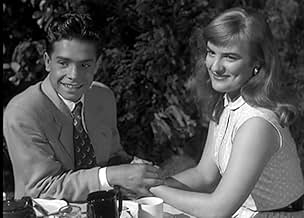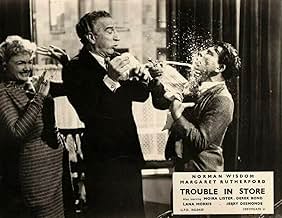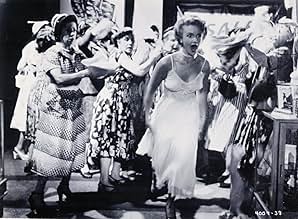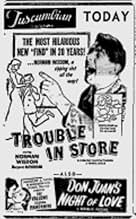NOTE IMDb
6,6/10
1,2 k
MA NOTE
Ajouter une intrigue dans votre langueNorman, a stockroom worker at a London store, aspires to be a window dresser. Pursuing his dream, he falls for a shopgirl and they uncover a robbery plot, miraculously foiling the thieves.Norman, a stockroom worker at a London store, aspires to be a window dresser. Pursuing his dream, he falls for a shopgirl and they uncover a robbery plot, miraculously foiling the thieves.Norman, a stockroom worker at a London store, aspires to be a window dresser. Pursuing his dream, he falls for a shopgirl and they uncover a robbery plot, miraculously foiling the thieves.
- Réalisation
- Scénario
- Casting principal
- Victoire aux 1 BAFTA Award
- 1 victoire au total
Sheila Aza
- Shop Assistant
- (non crédité)
Alan Beaton
- Shopper
- (non crédité)
Hamlyn Benson
- Mark
- (non crédité)
Paul Beradi
- Shopper Watching Model Train Display
- (non crédité)
Avis à la une
Though now slightly over fifty years old, Sir Norman's film debut remains one of his very best movies. 'Trouble In Store' finds the clown in top form, as a stock room worker who wishes to move up in the world and marry the girl of his dreams. Whether roller-skating behind a fast moving bus or crooning his biggest hit (and signature tune) 'Don't Laugh At Me', Norman demonstrates the charisma that made him such a major box office attraction.
Backing Norman is the fantastic Margaret Rutherford, who in only a handful of scenes steals the picture (and everything else!) as an elderly shoplifter. The very lovely Lana Morris also scores as the object of Sir Norman's affections. Lana comes across in this picture so well that it is a real pity that she did not have a better movie career.
Highlights range from Wisdom's window dressing 'duel' with Michael Ward, a very catchy duet with Lana (Norman once again showing us his great singing voice) and a fun Western parody climax. This movie seemed to fly by and is probably Sir Norman's most enjoyable film.
Backing Norman is the fantastic Margaret Rutherford, who in only a handful of scenes steals the picture (and everything else!) as an elderly shoplifter. The very lovely Lana Morris also scores as the object of Sir Norman's affections. Lana comes across in this picture so well that it is a real pity that she did not have a better movie career.
Highlights range from Wisdom's window dressing 'duel' with Michael Ward, a very catchy duet with Lana (Norman once again showing us his great singing voice) and a fun Western parody climax. This movie seemed to fly by and is probably Sir Norman's most enjoyable film.
Norman Wisdom's brand of comedy is an acquired taste; for those unfamiliar with his particular shtick, he's basically the British counterpart to Jerry Lewis - with all that it entails! I had watched a few of his films over the years but it'd been some time since then, so I decided to rent a 12-DVD Box Set (on Region 2) available from my local outlet - which, actually, I did mainly for my father's sake who used to lap his films up...and is already halfway into the collection as I write this!
Anyway, his debut feature is pleasant enough and is actually considered by many to be his best vehicle (though still featuring a couple of sentimental songs). In itself, simple-minded but occasionally inventive (particularly the window-dressing 'competition', the "sale day" rush and the climactic rounding-up of the bad guys) and with a premise that's seen service in countless 'comedian' films - Charlie Chaplin's short THE FLOORWALKER (1917) and again later in MODERN TIMES (1936), Harold Lloyd's SAFETY LAST (1923), The Marx Bros.' THE BIG STORE (1941) and Jerry Lewis himself in WHO'S MINDING THE STORE? (1963). Here the star is nicely abetted by Jerry Desmonde as his flustered boss (often serving as the brunt of Wisdom's accident-prone gags) and Margaret Rutherford as a charming elderly shoplifter.
Anyway, his debut feature is pleasant enough and is actually considered by many to be his best vehicle (though still featuring a couple of sentimental songs). In itself, simple-minded but occasionally inventive (particularly the window-dressing 'competition', the "sale day" rush and the climactic rounding-up of the bad guys) and with a premise that's seen service in countless 'comedian' films - Charlie Chaplin's short THE FLOORWALKER (1917) and again later in MODERN TIMES (1936), Harold Lloyd's SAFETY LAST (1923), The Marx Bros.' THE BIG STORE (1941) and Jerry Lewis himself in WHO'S MINDING THE STORE? (1963). Here the star is nicely abetted by Jerry Desmonde as his flustered boss (often serving as the brunt of Wisdom's accident-prone gags) and Margaret Rutherford as a charming elderly shoplifter.
When a major London department store is taken over by a new manager, Mr Freeman, stock boy Norman finds himself out of a job after a series of misunderstandings. He wins back his job in time to get embroiled in an internal robbery of the store.
This was the first of the Norman Wisdom/Rank comedies that became an annual money spinner from the 50's well into the 1960's. The plot is rarely important and here we have a mix of romance and robbery that supports the usual mix of accidents and misunderstandings. The romance and the robbery don't really work, the romance seems to happen far too quickly while the robbery is tacked on at the end.
Wisdom is as excellent as always - his uncoordinated, shy, eager, accident prone and misunderstood personality allows him to have a series of funny set pieces. It's an acquired taste, but if you like the short of slapstick humour then Wisdom will appeal to you. Wisdom regular Jerry Desmonde is good as the store manager and Margaret Rutherford (second in the cast list for a very small role) is funny as an upper-class shop lifter. The only weak link is Lister as Norman's love interest, she's a little light and her character changes depending on how the story is going.
Overall it's not a masterpiece but it's a good Norman Wisdom comedy. It won't appeal to everyone but it's a gentle family comedy from another age.
This was the first of the Norman Wisdom/Rank comedies that became an annual money spinner from the 50's well into the 1960's. The plot is rarely important and here we have a mix of romance and robbery that supports the usual mix of accidents and misunderstandings. The romance and the robbery don't really work, the romance seems to happen far too quickly while the robbery is tacked on at the end.
Wisdom is as excellent as always - his uncoordinated, shy, eager, accident prone and misunderstood personality allows him to have a series of funny set pieces. It's an acquired taste, but if you like the short of slapstick humour then Wisdom will appeal to you. Wisdom regular Jerry Desmonde is good as the store manager and Margaret Rutherford (second in the cast list for a very small role) is funny as an upper-class shop lifter. The only weak link is Lister as Norman's love interest, she's a little light and her character changes depending on how the story is going.
Overall it's not a masterpiece but it's a good Norman Wisdom comedy. It won't appeal to everyone but it's a gentle family comedy from another age.
"Trouble in Store" is one of the first films in which British actor Norman Wisdom starred. The versatile and talented Wisdom went on to a distinguished comedy career in England. He received a knighthood and retired from entertaining at the age of 90, living another five years beyond that.
Wisdom came from a poor beginning and broken family background. He learned to forage and scrounge early for survival and struck out on his own in his early teens. With such a background, the irrepressible Wisdom devoted a lifetime to trying to make people laugh. He especially liked to entertain children outside of films.
Besides his acting and athleticism that he used in his comedic roles, Wisdom had a very good singing voice. He learned to play several instruments – clarinet, sax, trumpet, French horn, drums and piano. He was also an accomplished songwriter.
In this early comedy film, he shows much of the slapstick, falling down, tripping and mishap behavior that became his trademark in many more films and in live performances. The supporting cast, plot and other aspects of the film are all good. But, this is a Norman Wisdom showcase all around.
In reading about this beloved English entertainer, I came across some of his clever quotes and cute sayings. Here's one that might describe the basis for his playful attitude and fun-filled approach to life: "Such is life and life is such and after all it isn't much. First a cradle. Then a hearse. It might have been better, but it could have been worse."
Wisdom came from a poor beginning and broken family background. He learned to forage and scrounge early for survival and struck out on his own in his early teens. With such a background, the irrepressible Wisdom devoted a lifetime to trying to make people laugh. He especially liked to entertain children outside of films.
Besides his acting and athleticism that he used in his comedic roles, Wisdom had a very good singing voice. He learned to play several instruments – clarinet, sax, trumpet, French horn, drums and piano. He was also an accomplished songwriter.
In this early comedy film, he shows much of the slapstick, falling down, tripping and mishap behavior that became his trademark in many more films and in live performances. The supporting cast, plot and other aspects of the film are all good. But, this is a Norman Wisdom showcase all around.
In reading about this beloved English entertainer, I came across some of his clever quotes and cute sayings. Here's one that might describe the basis for his playful attitude and fun-filled approach to life: "Such is life and life is such and after all it isn't much. First a cradle. Then a hearse. It might have been better, but it could have been worse."
I grew up watching this film, and his others, and even though I'd class The Square Peg as my favourite, I'd class trouble in store as one of the best. Watching it as an adult I still adore the innocent, sweet humour, but I also loved the more feeling side of it when he started singing. Performances vary a little it's fair to say, for me though the best of them is Margaret Rutherford, she is absolutely joyous as the eccentric, but slightly adorable thief. Her spree is a terrific scene, so funny, as is the the window display scene.
I had forgotten how nimble and fit Wisdom was, such a talented all rounder, he dazzles here.
I adore this film, and not just for the sake of nostalgia, 9/10.
I had forgotten how nimble and fit Wisdom was, such a talented all rounder, he dazzles here.
I adore this film, and not just for the sake of nostalgia, 9/10.
Le saviez-vous
- AnecdotesJill Craigie, who wrote the first draft of the script, is reported to have asked for her name to be removed from the credits after learning of Norman Wisdom's involvement.
- GaffesMiss Bacon glues three stickers to a suitcase; when she walks away, there are four stickers on it.
- ConnexionsFeatured in The Man Who Ruined the British Film Industry (1996)
- Bandes originalesI Want to Put on Record That I Love You
Lyric, David Arkell
Music, Mischa Spoliansky (as Spoliansky)
Performed by Norman Wisdom and Lana Morris (uncredited)
Meilleurs choix
Connectez-vous pour évaluer et suivre la liste de favoris afin de recevoir des recommandations personnalisées
- How long is Trouble in Store?Alimenté par Alexa
Détails
- Date de sortie
- Pays d’origine
- Langues
- Aussi connu sous le nom de
- Trouble in Store
- Lieux de tournage
- Sociétés de production
- Voir plus de crédits d'entreprise sur IMDbPro
- Durée
- 1h 25min(85 min)
- Couleur
Contribuer à cette page
Suggérer une modification ou ajouter du contenu manquant
































